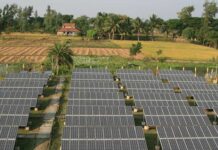Honeywell Automation India Limited (HAIL) has successfully delivered and commissioned a microgrid Battery Energy and Storage System (BESS) in India, for the Solar Energy Corporation of India’s (SECI) Lakshadweep Islands project.
SECI’s Lakshadweep Islands project is the country’s first on-grid solar initiative that uses BESS to manage the supply of renewable power. Honeywell’s BESS technologies are being integrated into the microgrid of the remote Kavaratti islands of Lakshadweep, supporting the strategic initiative of decarbonization of the islands’ energy supply.
Honeywell’s BESS technology includes a portfolio of solutions to help power producers store and distribute renewable energy. It includes a complete end-to-end solution that controls automation, safety, and efficiency aspects with a facility to render remote operations for battery modules and grid management systems to enable renewable power to be used within a microgrid that can also co-exist alongside national grid supply.
For the Lakshadweep project, Honeywell is supplying its Energy Management System (EMS)/Microgrid controller and Power Plant Controller to manage the distribution of renewable energy, as well as a range of BESS sub-systems.
“We are committed to supporting India’s energy transition and energy self-reliance initiative by driving constant technology and software innovation to participate in the country’s Net Zero 2070 goal. To get there, new power/energy sources will be required, including renewables. Honeywell’s BESS technology is one of the fundamental enablers of this transition. The integration of our BESS technology into the Lakshadweep microgrid system is a positive step forward in this journey, and we are proud to play a critical role,” said Ashish Gaikwad,VicePresident and General Manager, of Honeywell Industrial Automation India.
Honeywell delivered the end-to-end solution to SunSource Energy Private Limited, a leading solar company in India for its contract from Solar Energy Corporation of India Ltd. The project was inaugurated by the Honourable Prime Minister of India, Shri Narendra Modi.
This prestigious initiative marks the first non-containerized BESS, approved by SECI, and integrates advanced Energy Management Systems (EMS) with LEDA’s Distribution Generation Microgrid, heralding a new era of green energy for the Lakshadweep Islands.
At present, nearly all the consumed power and energy in Lakshadweep is provided by diesel generator units. These large petroleum-based generators have high carbon emissions and further have a dependency on the mainland for fuel, which increases the average cost of electricity. Santanu Guha, CEO, SunSource Energy said, “We are very happy to play a pivotal role in this landmark project that supports the energy transition efforts of the Union Territory of Lakshadweep and that aligns with our commitment to advancing sustainable projects that contribute to the country’s net-zero goals.”
As per the Ministry of New and Renewable Energy, Govt. of India, the 1.7MWp Solar and 1.4MWh BESS-enabled Lakshadweep project aims to save ₹2500 million over the lifetime, reduce diesel consumption by 19.8 million litres, and offset 58000 tonnes of carbon emissions.
“This project addresses the energy challenges of Lakshadweep and aligns seamlessly with the broader national objective of promoting green energy. We believe it will pave the way for more sustainable and resilient energy solutions for island regions across the country,” said Shreedhar Singh, Additional General Manager at SECI.
The 1.4MWh BESS delivery scope includes Honeywell’s fire suppression system, Energy Management System (EMS)/Microgrid controller, and Power Plant Controller. Honeywell EMS use cases include capacity smoothing, peak shaving, volt VAR control, black start operation, and constant charging and discharging.
The successful delivery and commissioning of Honeywell’s pioneering battery energy and storage system in the Lakshadweep Islands Project signifies a significant step towards decarbonization and wider accessibility of power in support of the nation’s commitment to achieving net-zero emissions.






![SMART ENERGY WEEK [September] 2025 to Lead Global Renewable Energy Advancements SMART ENERGY WEEK](https://timestech.in/wp-content/uploads/2025/07/Untitled-design-2025-07-31T112230.406-218x150.jpg)










